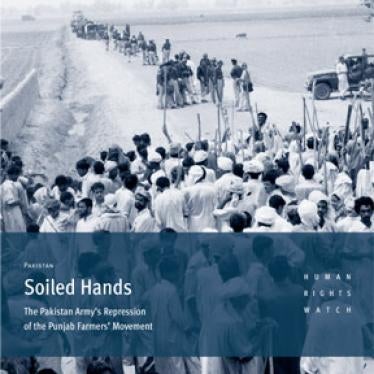(London) - In the Pakistani military’s traditional stronghold of Punjab, paramilitary forces working with the army are killing and torturing farmers who refuse to sign contracts that would cede their land rights to the army, Human Rights Watch said today. To coerce farmers to comply, paramilitary forces are torturing children and forcing couples to divorce.
The 54-page report, Soiled Hands: The Pakistan Army’s Repression of the Punjab Farmers’ Movement documents the Pakistani military’s brutal repression of a farmers’ movement in Okara district of Punjab, the province that provides the vast majority of recruits to Pakistan’s armed forces. For the past two years, tens of thousands of tenant farmers in Okara have resisted efforts by the military to weaken their legal rights to some of the most fertile farmland in Pakistan, which many of their families have worked for generations.
“Pakistan’s military and paramilitary forces are brutalizing their own people in the Punjab instead of protecting them,” said Brad Adams, executive director of Human Rights Watch’s Asia Division. “It’s a dangerous moment in Pakistan when the military turns on its own core constituency.”
Though the Pakistan Army says it owns the land in Okara, the claim is disputed by most legal experts, tenant farmers and the Punjab provincial government, which has refused to sign the land over to the military despite repeated requests from the powerful armed forces.
In response, Pakistani paramilitary forces have subjected the farmers to a campaign of murder, arbitrary detention, torture, “forced divorces,” and summary dismissals from employment. On two occasions, the paramilitaries have literally besieged villages in the area of dispute, thus preventing people, food and public services from entering or leaving for weeks on end.
The armed unit responsible for most of the abuses against the farmers is the Pakistan Rangers, a paramilitary force normally used for border security. To coerce the farmers into signing new tenancy agreements, the Rangers set up “torture cells,” a term commonly used in Pakistan by officials and citizens alike to describe areas within detention centers that are used for coercive interrogations of suspects.
The Rangers have tortured the children of farmers to coerce them into signing tenancy agreements, according to testimony by 30 children interviewed by Human Rights Watch. Because the Rangers have targeted children of recalcitrant farmers for kidnapping and torture, schools in the affected areas have periodically closed down.
In some cases, the paramilitary forces have even forced young couples to divorce by torturing husbands or other male relatives, as a means of publicly shaming their families. On military farms, employees who are related to farmers who have refused to sign the new contracts have been fired or barred from work and threatened with torture.
“The Okara dispute demonstrates the reality of military rule in Pakistan,” said Adams. “The military is going to great lengths to teach the lesson that anyone who resists its grip on the economy will be severely punished.”
Land ownership remains one of the chief sources of wealth and social privilege in Pakistan. The Pakistani army is possibly the largest landholder in the country, and the military commonly dispenses land as patronage to civilians and perks to its own officers.
Although the Rangers are nominally under the jurisdiction of Pakistan’s federal interior ministry, they draw their cadres from military personnel and work in close conjunction with, and often at the behest of, the Pakistani army.
In Okara, senior military and political officials in Pakistan have either participated in or allowed violations to occur. In some cases, the police have assisted the Rangers in perpetrating abuses.
“This is a dispute that both sides believe they cannot afford to lose,” Adams Said. “For the Pakistani military establishment, control of land is essential for maintaining its position within the country’s political structure. For tenant farmers, access to land is often the difference between a full belly and hunger.”
The report is based on more than 100 interviews with tenant farmers, their children, and some of the alleged perpetrators of the abuses.
Accounts from “Soiled Hands: The Pakistan Army’s Repression of the Punjab Farmers’ Movement”
We were produced before Major Tahir Malik. He asked why we had not made the contract payments. We answered that we had no money. They took us to the torture cell and Jallad [“tormentor”] Munir started thrashing us with a leather whip. He made us all strip naked and whipped us till we bled. Major Tahir Malik would personally supervise the whippings, abuse us, laugh at us, and punch us…. We were produced before officers again in the morning. They would insist that we pay the contract money. Upon our refusal, it would begin again.
—Interview with Iqbal, a tenant farmer in Okara, October 23, 2003
They snatched our milk and our bicycles. Gomi, the informer, took away the milk and bicycles. They blindfolded us and took us to Rangers Headquarters. As soon as we got there, they started beating us with sticks. After a while we even stopped crying or screaming…. There were 16 [adult] farmers [already present when] we arrived there. [We saw them being] beaten badly with a flat leather whip by Munir “Jallad” and Inspector Aashiq Ali in the presence of Major Tahir Malik. The farmers were bleeding and crying in pain. Some were weeping out of fear and sitting with their heads bowed.
—Interview with Abid Ali, aged 10, Okara, October 24, 2003







